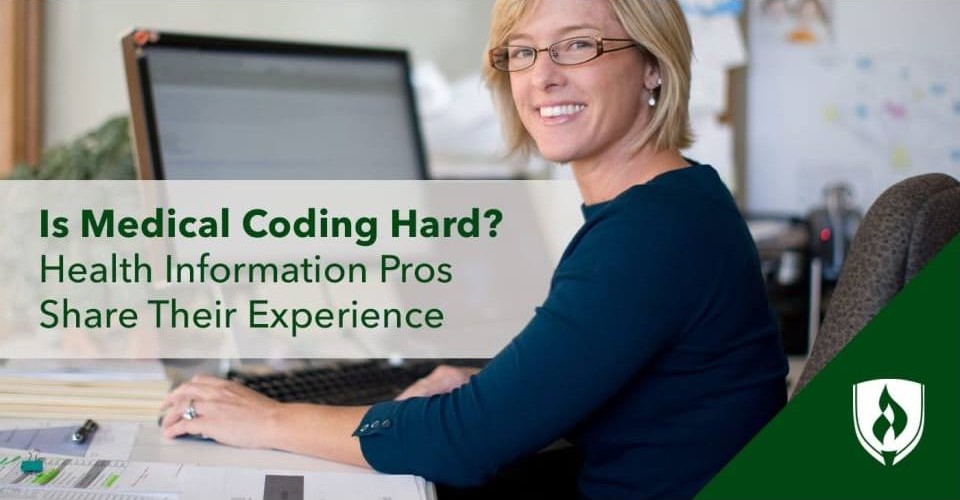Is Medical Coding Hard? Health Information Pros Share Their Experience
By Ashley Brooks on 02/17/2020

There’s no denying that healthcare careers can be complicated. Healthcare professionals attempt to understand, interpret and diagnose problems in the complex human body. Even a health information technician (HIT) career, which doesn’t involve working directly with patients, requires a strong understanding of the various codes assigned to different medical diagnoses.
Those HIT careers certainly sound intriguing, despite their reputation for being complex. If you’re looking for an in-demand option that you could launch without earning a bachelor’s degree, medical coding might be the perfect fit.
But you can’t help but wonder: Is medical coding hard?
Learning the ropes as a medical coder may not be simple, but that doesn’t mean it’s impossibly difficult. We asked experts in the field to provide insight on their experience learning medical coding. But before we jump in and discuss their experience, let’s first discuss what medical coding is and why it matters.
What is medical coding, exactly?
Simply put, medical coding is the practice of assigning informative standardized labels for medical procedures and diagnoses. These standardized formats help keep the massive amounts of health data produced every day organized—which is a big plus for providers, insurance carriers and researchers alike. There are three universal medical coding systems—CPT, ICD and HCPCS—that are primarily used around the world.
So how does medical coding work in practice? Whenever a patient goes to a healthcare provider, the visit is assigned specific medical codes to help track the reason for the visit, as well as any procedures that were performed. Medical coding is the step in the medical billing process that assigns codes to insurance claims so that a patient’s insurance can be correctly billed.
This system of medical coding ensures that healthcare visits are categorized correctly when it comes time to bill and process insurance claims. The medical coder is the person responsible for allocating those specific medical codes to each claim.
Is medical coding hard?
Medical coders hold a lot of responsibility, and it sounds daunting to become familiar with many different medical codes. But there’s no need to worry! Medical coding isn’t as hard as it seems at first glance.
“It is like learning a foreign language,” says Bonnie Moore, RHIT and HIT program coordinator at Rasmussen University. “What makes it difficult is that there are three major coding systems and each of them is different. So you are learning three foreign languages.”
Learning a new language takes some effort, but it’s definitely not impossible. Meredith Kroll, clinic coder at Ridgeview Medical Center, believes that the most challenging parts of her journey to learn medical coding have been vital to her success on the job. “I think my job now is easier than my coding schooling, which means I was well prepared for my new career.”
Kroll advises new medical coders to keep trying and asking questions about anything that doesn't make sense. “It will eventually click,” she says. “Once I actually started working as a coder, I was really thankful for all the questions that I asked while learning.”
What are the most challenging aspects of medical coding?
Like any career, medical coding comes with some unique challenges. Human anatomy and healthcare have a lot of gray areas, but medical coding is black and white. It can be challenging to transform cloudy and complex medical symptoms into clear, discernible codes.
Another challenging aspect is keeping up with industry changes. Medical coding systems have changed substantially in recent years—and it takes flexibility to keep up. The changes in governance and healthcare regulations can all impact coding, so it is critical for coding professionals to stay on top of these changes to avoid documenting inaccurate information.
But these challenges come with an upside: “That is why there is more demand for educated and credentialed coders,” Moore explains. “The good news is that the pay typically increases with the more experience and credentialing you have.”
What are the most enjoyable parts of medical coding?
Medical coding may be a challenge to learn at first, but that doesn’t mean it can’t be a fun job in the long run.
“Coding and billing is all about being a detective,” Moore says, adding that dissecting a patient’s medical record, tracking down additional information and even learning to read the medical records can be quite enjoyable.
“The daily work can be very entertaining,” Kroll says, as coders get to see plenty of interesting medical stories coming across their desks. “It's very interesting to read some of the reasons that people come into the clinic—what kids have stuck in their ears or noses, or the stories behind people's sprained ankles.”
Medical coding also isn’t as isolating as people may think. Kroll has met all the primary doctors she codes for and enjoys communicating with coworkers throughout the day. “I have found that most people who work in this field are fun and great to work with,” Moore says.
The benefits of medical coding training
Medical coding is a skill that can be learned like any other. Just like learning to play an instrument or drive a car, formal training with professionals who know their stuff can give you a leg up as you work to master the foreign language of medical coding.
A Medical Coding and Billing Certificate program is an option worth considering if you’re serious about becoming a medical coder. The Rasmussen University program can be completed in as few as nine months, with plenty of opportunities to learn and practice real-world skills.1 Here are a few of the courses aspiring medical coders will complete in this program:
- Coding Foundations
- Ambulatory Care Coding
- Revenue Cycle and Billing
- Medical Terminology
- Pathophysiology and Pharmacology for Health Information
Additionally, the Rasmussen University Medical Billing and Coding Certificate program helps prepare students for the Certified Coding Associate (CCA) or Certified Coding Specialist (CCS) certification exam offered by the American Health Information Management Association (AHIMA). These professional certifications can help build your resume and show employers you’re serious about a health information career.
“The schooling isn't easy, but it is well worth it in the long run,” Kroll says. Your reward for the work of learning a new “language” is a satisfying healthcare career that is critical to medical facilities.
Start mastering medical coding
So, is medical coding hard? It may not be simple, but it’s not impossible! With the right training and enough practice, medical coding is a career within your reach. Take the first step with our article, “Your 5-Step Guide to Become a Medical Coder!”
Related Articles:
1Completion time is dependent on the number transfer credits accepted and number of courses completed each term.
EDITOR’S NOTE: This article was originally published in 2016. It has since been updated to include information relevant to 2020. Insight from Moore and Kroll remains from original article.




